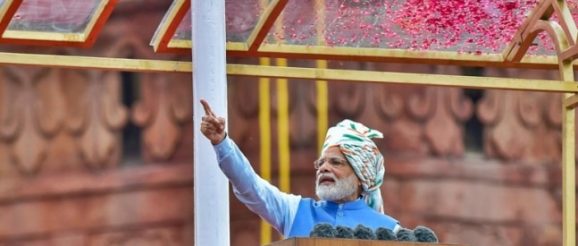PM Modi calls for push into research & innovation: A look at challenges that remain – SCIENCE News

Addressing the nation on the 76th Independence Day, Prime Minister Narendra Modi added Jai Anusandhan (research, innovation) to the Jai Jawan, Jai Kisan, and Jai Vigyan slogans used by leaders in the past. Speaking from the ramparts of Red Fort, the prime minister called for a fresh push into research and innovation in the country in the decade that follows.
PM Modi said that to the slogan of Jai Jawan, Jai Kisan, former prime minister Atal Bihari Vajpayee had added Jai Vigyan and now, India will append Jai Anusandhan to it. “Jai Jawan, Jai Kisaan, Jai Vigyaan, Jai Anusandhan — as we celebrate 75 years, we need to follow this mantra that was given to us by Lal Bahadur Shastri & later tweaked by Atal Bihari Vajpayee,” PM Modi said.
The newest addition is being hailed as a welcoming change by academics who have for long complained about the poor investment in the field of research and development by both by the public and private sectors. While PM Modi’s push is expected to boost new investments, there are challenges that remain.
POOR GOVT TRACK RECORD
Government investment in R&D has been predominantly low — it has been lower than 1 per cent of the Gross Domestic Product (GDP). The Centre had allocated 0.41 per cent of the GDP to research and development in the 2022-23 budget presented earlier this year.
According to data from the World Bank, India’s percentage expenditure on research and development was barely 0.66 per cent of the GDP in 2018 and it remains below Australia, Belgium, and Brazil among others. While there has been a lack of investment from the Centre, the private sector has also been found wanting in putting money into R&D over fears of losing investments if the research does not lead to optimal results.
LACK OF INTEREST
While lack of funding is an issue, academics also point to a lack of interest in people to be involved in research. Talking about the healthcare sector, which is overwhelmed but full of innovation opportunities, Dr. Deepak Shukla, CEO, PSRI hospital said that when you are involved in research, it calls for complete dedication.
“The healthcare scenario has become so commercially dominated that there are questions about who will do the research. It has to be done by doctors, and most of them are engaged aggressively in their practice with no spare time for research, but research wants the talent to submit their attention and love the methodology and analysis. We have a huge database but who will analyze it?” Dr. Shukla said.
BUREAUCRATIC HASSLES
Bureaucratic red tape has remained a long concern for researchers and innovators in the country alongside delays in patent approvals that further slow down the development and manufacturing processes. Pointing out the delays, Tarun Souradeep, Director of Raman Research Institute, said that an MoU to build a gravitational detector site in India was signed in 2016, however, it still awaits approval from the Prime Minister’s Office and the Cabinet.
While calling PM Modi’s words a welcome change, he expressed his worry about old initiatives being put on the back burner. “Government should bring out a program where older plans are prioritized in the new set of schemes and are not lost in the process.” He also pointed to the overhead inquiries that researchers have to go through to get technical clearance to bring in equipment from outside the country, which leads to delays, and urged the government to reduce them.
“Lack of ease of functional governance within academic institutions and administrative red tape act as bottlenecks to creative pursuits,” Professor Dibyendu Nandi of the Indian Institutes of Science Education and Research (IISER), Kolkata said.
A WELCOME MOVE
Research scholars, practicing doctors, and professors have welcomed the new move, saying that it is critical to support and nurture this ecosystem and provide opportunities within India so that our younger generation can contribute to the growth.
Professor Dibyendu Nandi said, “As a scientist who returned to India after spending several years abroad, also as a member of the scientific community who are collectively concerned with the lack of increasing investments in basic sciences and innovation, I welcome the Prime Minister’s emphasis on celebrating science, research, and innovation.”
He urged the government to rapidly increase its investments in science and technology research so that in the 100th year as a free country, citizens can look back and say “we are here because someone had the foresight to believe we can change the world.”
Healthcare experts called for innovation in the fields of drug development and in the development of affordable high-end health care technology for the masses, especially in surgery, radiology, and chemotherapy, among others. Innovation in healthcare delivery could also be explored in the country and made it more patient-friendly, less cumbersome, and with low administrative hassles.
While the world continues to move further into science, innovation, and technology, a new push into R&D could bring India closer to the fight and at par with world leaders as it aims to cater to the global mass and the growing population at home.
